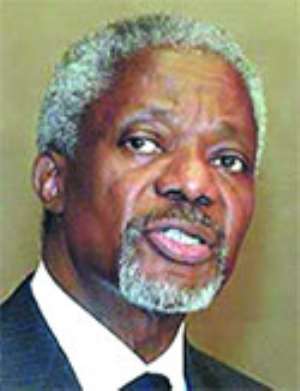
While Ghana makes strides at achieving its Millennium Development Goals, it has been urged to consolidate it with infrastructural development and ensuring energy sufficiency. The former United Nations General Secretary, Kofi Annan, made this call at the maiden UN Foundation's Board meeting in Accra yesterday.
The meeting comes at the culmination of a year-long effort by the UN Foundation to raise awareness about the need for innovative partnerships between governments, civil society, and the private sector with the UN to address global challenges.
The meeting in Ghana builds on the positive momentum generated during the recent high-level UN Summit in New York that showcased how the UN is achieving progress in Africa and must be accelerated around the world.
According to the former UN boss, the issue of energy insufficiency and sparing infrastructural gaps continue to be the two major constraints that impede progress on the African continent which needs pragmatic policies to address even as it makes strides at achieving the Millennium Development Goals.
Ghana may have made some significant strides in efforts at attaining all the eight Millennium Development Goals (MDGs) before the targeted year of 2015 but current indicators point to the fact that some of the goals might not be met considering current indicator.
To help accelerate efforts at reaching sets targets under the MDGs however, the former UN boss called on the citizenry to demand the attainment of these set goals from their political leaders. 'It is only through this that we can put pressure on the politician to work towards achieving these goals,' he said.
According to him, Ghana needs a national policy direction which would serve as the guideline for the continuity of national programmes. The President of the United Nations Foundation, Timothy E. Wirth, reiterated that unless pragmatic polices are put in place to have sufficient energy access and infrastructure development put high on the agenda, the attainment of the MDGs could be illusive. 'You can't have development without access to energy,' he emphasized.
According to a recent report on Ghana's progress on the attainment of the MDGs, 'although evidence shows that there has been significant reduction in both infant and under five mortality rates in Ghana, it is unlikely that the 2015 target of reducing the child mortality rates will be met unless coverage of effective child interventions is increased.'
Data presented in the report states that the Ghana Demographic and Health Survey 2008 showed a 30% reduction in the under-five mortality rate, as it declined from 111 per1000 live births in 2003 to 80 per 1000 live births in 2008, while infant mortality rate as at 2008 stood at 50 per 1000live births compared to 64 per 1000 live births in 2003.
Available Statistics indicate maternal mortality rate reduced from 740 per 100,000 live births in 1990 to 503 per 100,000 live births in 2005, and then to 451 deaths per 100,000 live births in 2008.
This, Timothy E. Wirth thinks needs a much more concerted policy directive and political will if Ghana is to make significant gains with respect of reducing maternal and infant mortality to its barest minimum.
He called for more efforts at promoting reproductive health care in the country.
Dr Peter Quartey, a Senior Research Fellow at the Institute of Statistics, Social and Economic Research (ISSER) also told the Chronicle that certainly the achievement of poverty reduction targets and other MDG goals depends largely on infrastructure and energy 'if your roads are bad food prices will be very high you cannot move your food items to where they are needed.' He noted.
The United Nations Millennium Declaration, adopted by the world's leaders at the Millennium Summit of the United Nations in 2000, captured the aspirations of the international community for the new century.
The agenda was to eradicate extreme poverty and hunger, achieve universal primary education, promote gender equality and empower women, reduce child mortality improve maternal health ,combat HIV/AID, malaria and other diseases ,ensure environmental sustainability, and develop global partnership for development.
The latest report indicated Ghana was making that steady progress to the achievement of those goals.




 Togo leader Gnassingbe follows father's political playbook
Togo leader Gnassingbe follows father's political playbook
 NDC panics over Bawumia’s visit to Pope Francis
NDC panics over Bawumia’s visit to Pope Francis
 EC blasts Mahama over “false” claims on recruitment of Returning Officers
EC blasts Mahama over “false” claims on recruitment of Returning Officers
 Lands Minister gives ultimatum to Future Global Resources to revamp Prestea/Bogo...
Lands Minister gives ultimatum to Future Global Resources to revamp Prestea/Bogo...
 Wa Naa appeals to Akufo-Addo to audit state lands in Wa
Wa Naa appeals to Akufo-Addo to audit state lands in Wa
 Prof Opoku-Agyemang misunderstood Bawumia’s ‘driver mate’ analogy – Miracles Abo...
Prof Opoku-Agyemang misunderstood Bawumia’s ‘driver mate’ analogy – Miracles Abo...
 EU confident Ghana will not sign Anti-LGBTQI Bill
EU confident Ghana will not sign Anti-LGBTQI Bill
 Suspend implementation of Planting for Food and Jobs for 2024 - Stakeholders
Suspend implementation of Planting for Food and Jobs for 2024 - Stakeholders
 Tema West Municipal Assembly gets Ghana's First Female Aircraft Marshaller as ne...
Tema West Municipal Assembly gets Ghana's First Female Aircraft Marshaller as ne...
 Dumsor is affecting us double, release timetable – Disability Federation to ECG
Dumsor is affecting us double, release timetable – Disability Federation to ECG
